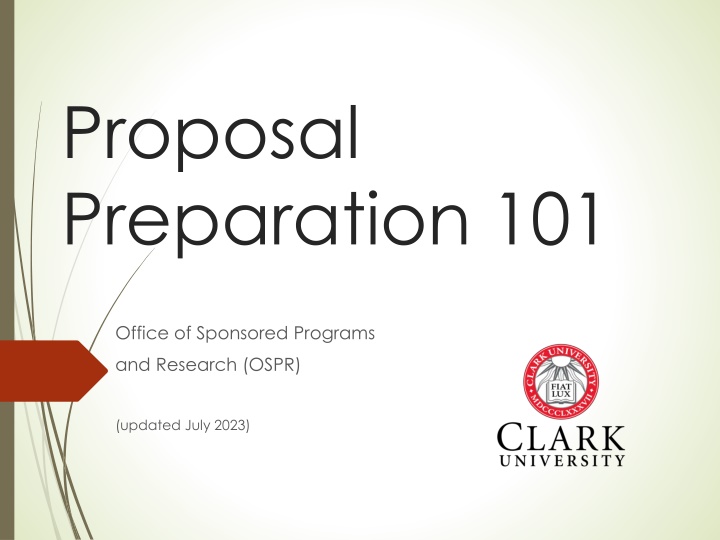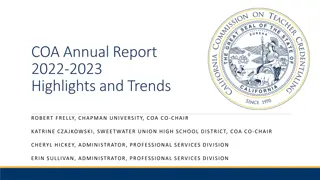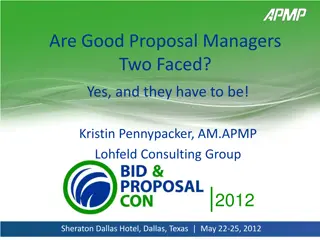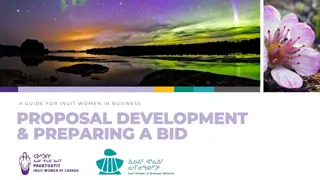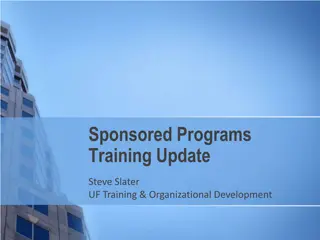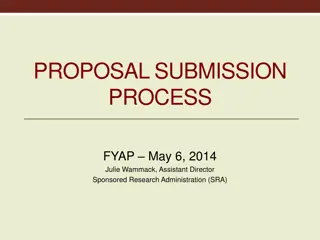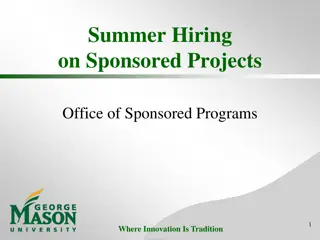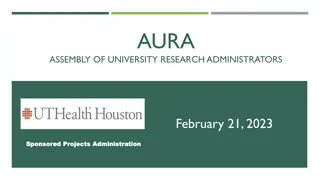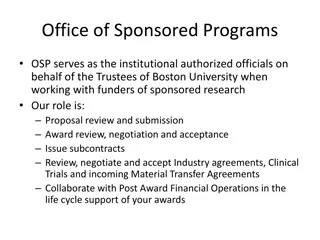Effective Proposal Preparation Strategies for Sponsored Programs
Discover essential steps for successful proposal preparation when seeking external funding for research, educational, and training projects. Learn the roles of Office of Sponsored Programs and Research (OSPR) and Corporate and Foundation Relations (CFR) in the process. Understand how to contact the appropriate office based on the sponsor type and effectively submit a proposal by following a structured plan and timeline.
Uploaded on Feb 18, 2025 | 1 Views
Download Presentation

Please find below an Image/Link to download the presentation.
The content on the website is provided AS IS for your information and personal use only. It may not be sold, licensed, or shared on other websites without obtaining consent from the author.If you encounter any issues during the download, it is possible that the publisher has removed the file from their server.
You are allowed to download the files provided on this website for personal or commercial use, subject to the condition that they are used lawfully. All files are the property of their respective owners.
The content on the website is provided AS IS for your information and personal use only. It may not be sold, licensed, or shared on other websites without obtaining consent from the author.
E N D
Presentation Transcript
Proposal Preparation 101 Office of Sponsored Programs and Research (OSPR) (updated July 2023)
Office of Sponsored Programs and Research (OSPR) OSPR at Clark University is responsible for the review and submission of external funding requests and the acceptance of external funding for all university-based research, educational, training and other projects for which the sponsors require conditions in return for their financial support. These include grant, subgrant, contract, subcontract, and cooperative agreement applications and proposals, federal or non-federal, including continuations, extensions, renewals, supplements, and transfer applications for all departments. This review and processing constitutes "institutional approval." OSPR works with a range of university offices to ensure the post award management of all sponsored projects.
Corporate and Foundation Relations (CFR) CFR is responsible for approving external funding requests to private sponsors, i.e. corporations, foundations and non-government organizations. These requests to private sources are for sponsored programs and require review from CFR prior to the same review process by OSPR as funding requests made to public sponsors.
Whom Should I Contact? If your request will be sent to a public sponsor, contact OSPR first to get guidance. If your request will be sent to a private sponsor, contact CFR first to get guidance. Public Sponsors Private Sponsors Federal State Local Government Other Government Agencies Corporations Foundations Non-Profit Organizations (NGOs)
Steps to Submitting a Proposal Be Prepared 1 1 Don t wait for a looming proposal deadline Check in with faculty on proposal plans and communicate those with OSPR and CFR Gather common proposal elements in advance: Faculty biosketches (NSF/NIH forms) Current and Pending Research Form Current faculty pay Departmental Facilities and Equipment statement Get to know the OSPR website Acquaint yourself with websites and grant proposal guides for common funders in your area.
Create a Plan and Calendar 2 2 Create a task list and schedule with the PI: What is the grant deadline? What is the internal OSPR (and CFR) deadline? Note the 5 & 10 business day rule! What tasks need to be done? Who will do what? By when? Review the Proposal Considerations Checklist and make sure PI has too. Are there any issues that need to be addressed now? Create timeline based on workplan, working back from internal OSPR (and CFR) deadline
Read Instructions 3 3 Review Request for Proposal (RFP)/Grant Solicitation, and any grant proposal guides or other application instructions Do not deviate from application instructions, not even by one nanobit. Pay special attention to: Deadlines Fonts Margins Page limits Names for attached files
Gather Materials 4 4 Important Institutional Information Standard Address/Contact Info to be used on Proposals Building a Budget and Budget Justification Fringe Rates Indirect Rate Current Rate Agreement Financial Conflict of Interest Disclosure Form(s) Grant Proposal Summary & Approval Form/Instruction Proposal Considerations Checklist
Allow time 5 5 Allow time to gather and develop materials, review, edit, re-review and re-edit. OSPR requires the full grant application at least 5 business days before submission 10 business days, if submitting through CFR. Application components may include: The final or close-to-final narrative Budget and budget justification, subaward budget/justification Internal Summary and Approval form Financial Conflict of Interest Disclosure Form (for EACH Clark person who will work on the project paid or not) Certification pages A draft of any required letter of support from Clark, and Any other documents (biosketches, collaborator letters and budgets, institutional documents, etc.) required by the application
Institutional Information Legal Corporate Name: Trustees of Clark University Type of Organization: Private, Non-Profit, Educational, 501(c)3 Legal Address: Clark University, 950 Main St., Worcester, MA 01610 Congressional District: Second of Massachusetts Federal Entity(Employer EIN #): 042 111 203 UEI #: LD3WUVEUK2N5 Civil Rights Assurance of Compliance #310210 1/11/65 Human Subjects FWA: 00000262 Data About Clark | Sponsored Programs and Research | Clark University
Address/ContactInfo Authorized Institutional Officials for Proposals NAME TITLE PHONE EMAIL Yuko Aoyama (Authorized Institutional Representative) Assoc. Provost & Dean of Research and Grad Studies Director, OSPR 508-793-7779 (Tel) yaoyama@clarku.edu Lisa Gaudette 508-421-3835 lgaudette@clarku.edu thearnlaye@clarku.edu Tammy Hearnlaye (Financial Contact) Associate Controller 508-793-7297
Building a Budget A budget is generally divided into two classifications: Direct Costs Indirect Costs, also known as Facilities and Administrative Costs (F&A Costs) and Overhead Costs
Direct Costs Direct Costs are expenses that are directly attributable and chargeable to a particular sponsored project relatively easily and with a high degree of accuracy. Direct costs may include: Personnel -- Salaries and wages, plus fringe benefits Travel Foreign and Domestic Materials and supplies Equipment over $5000 per item Publication Costs Consultant Services Subawards/Consortium/Contractual Costs Other (e.g., tuition, participant payments, graphic services, etc.)
Getting Started on a Budget Make sure that the costs are reasonable, sufficient, allocable & allowable Justify every cost: Casual costs can be the downfall of a proposal Cutting costs below what is reasonable can result in unnecessary departmental or personal cost sharing Questions to ask: How long will the project last? Who is to be included in the project? (Faculty, staff, students, consultants, subcontracts?) How much time will faculty devote to the project? Does the project require new equipment and/or materials and supplies? Does the project require travel? Will there be publishing costs?
Fringe Benefit Rates Current Fringe Benefit Rates (effective 6/1/2022 - 5/31/2026) Fringe Benefits are employee benefits paid by the employer that cover FICA, Worker s Comp, Withholding, Insurance, Clark match on retirement and sabbatical leave, etc. Federally Funded Projects 45.9% Non-Federally Funded Projects 48.7% Personnel Full-time Tenure Track faculty Faculty summer salary 13.5% 13.5% Full-time Professors of Practice, Post- Docs, and Staff Part-time Faculty & Staff, Temporary Employees. PhD Graduate students (Union positions) Graduate and non-work study undergrad student employees, Summer Only 26.1% 28.7% 13.5% 13.5% 9.7% 9.7% 9.7% 9.7%
Indirect Costs Clark University's Indirect Cost rates are comprised of three major categories: Facility-related costs Service-related costs Administrative costs Indirect Cost Rates (effective 6/1/22) 50.3% for on-campus projects 20.7% for off-campus projects (only applicable in limited circumstances check with OSPR first before using)
Review Checklist Timeline Create a task list and schedule with the PI on what needs to be done, by whom and by when Funder Guidelines Review Funder Guidelines type of application, period of performance, format, and how it is to be submitted Check with OSPR if funder s allowable indirect recovery is different from Clark s rate Verify required components OSPR Forms Proposal Summary & Approval Form Financial Conflict of Interest Form (from each Clark person who will have a role in the grant) Budget Check the math for accuracy and correct categories Check indirect costs; if indirect rate used is lower than the federal rate, then supply OSPR with funder guidelines
Checklist, Contd Confirm faculty salary(ies) summer, academic Check that correct fringe rates are being used For multi-year request, 3% cost of living increase should be included on salaries and some other budget lines as appropriate Students correct fringe rates, 3% raise per year for multi-year (except for undergraduate wages) Stipends/honoraria: no fringe for presenters (except for Clark employees) Consultants complete Employee versus Independent Contractor Classification Checklist when not a consulting company to confirm consultant status ok. Travel, Equipment and Other Direct Costs Check that the costs are necessary, reasonable, allowable and allocable Are travel costs based on federal per diem rates or other justifying information? Subcontract(s) or Subaward(s): Submit a budget for each Submit a letter of commitment from each Scope of work included for each Check RFP on indirect recovery rules on subcontracts Review Proposal Considerations Checklist
Contact Information For additional information please contact: Lisa Gaudette, Director, OSPR lgaudette@clarku.edu 508-421-3835 Mira Ormsby, Assistant Director, OSPR mormsby@clarku.edu 508-793-7765
